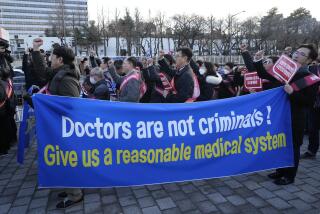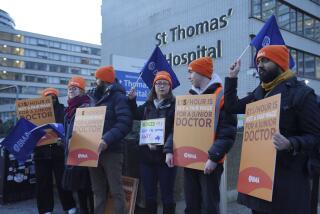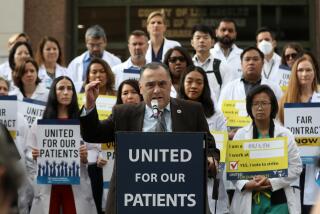N.J. Doctors Stage Walkout
- Share via
PARAMUS, N.J. — Thousands of New Jersey physicians stopped treating all but emergency cases Monday to protest soaring rates for malpractice insurance.
Setting aside stethoscopes and scalpels, the doctors staged rallies, donated blood, held meetings in hospital auditoriums and lobbied legislators in an effort to cap jury awards for pain and suffering at $250,000.
Many of the demonstrations were muted because of the space shuttle tragedy.
“Tort reform now,” doctors chanted outside the Jersey Shore Medical Center, a 502-bed hospital in Neptune, N.J., as some of the 700 physicians and their supporters held up signs proclaiming: “Having a medical emergency? Try calling 1-800-LAWYERS.”
A consumer group that has criticized the doctors’ complaints about rising rates held a smaller rally in the state capital of Trenton.
“This is about victims and families, not doctors,” Pete Guzzo, director of New Jersey’s Consumers for Civil Justice said, using a 15-foot-tall wheelchair as a backdrop.
Across the state, hospitals added extra emergency room staff to handle patients whose physicians’ offices were closed. Some hospitals reported higher caseloads in emergency departments.
“There will be an increase in volume, certainly,” said Megan Fraser, a spokeswoman at the Valley Hospital in Ridgewood, N.J., where emergency personnel said some people were arriving with sore throats and fevers who would usually be treated in doctors’ offices.
Like other medical institutions, the Valley Hospital set up elaborate plans so serious illnesses could be handled promptly.
“We are talking about a statewide movement involving thousands of doctors,” said Dr. Joseph Ahlborn, 49, director of surgery at the 451-bed Valley Hospital. “We are talking about thousands of operations that have been canceled.”
Dr. Robert S. Rigolosi, president of the Medical Society of New Jersey, said about 70% of the state’s 22,000 doctors participated in the protest. His estimate could not be independently verified.
Standing with about 100 physicians, many wearing white coats during a rally in the parking lot of a blood bank in Paramus, N.J., Rigolosi pledged the job action could last for some time.
“We are willing to stay out for elective procedures indefinitely,” he said.
“This is not one day,” added Dr. Ruth Schulze, who practices obstetrics and gynecology. “I have no appointments booked for two weeks.”
The decision by New Jersey doctors to stop routine treatment follows similar but smaller actions in other states.
In Florida, more than 800 doctors with offices in the Palm Beach area halted practice for two days. In November, hundreds of Georgia doctors marched on the capital, protesting insurance premiums. About two dozen surgeons in West Virginia staged a walkout in January. Their strategy was successful: A committee of the state Legislature approved a limit on malpractice awards.
The medical activism did not go unnoticed in New Jersey.
“This happened in doctors’ lounges, in operating rooms, in parking lots, in hallways when enough people began to talk about this in a serious way,” Ahlborn said. “There were a thousand people who shared this feeling passionately.
“I have two very good friends. They are both surgeons. One is in law school and the other has been accepted to law school,” he added. “They are leaving very active practices.”
The movement grew when New Jersey’s medical society voiced support, urging doctors to march on Trenton today to press the Legislature and Gov. James E. McGreevey for changes.
Rigolosi said the society wanted New Jersey to enact California’s $250,000 limit on awards for pain and suffering, which has resulted in the malpractice insurance premiums California doctors pay increasing about half as fast as the national average. Opponents argue that the situation is far more complex, with other factors contributing to the rise in rates in New Jersey, including reluctance to crack down on possibly inept doctors, and the investment practices of some insurance companies that write policies in the state.
“The answer is these huge jackpot awards, these $20 million and $9 million awards that’s breaking the bank, that’s depleting the insurance companies of funds they don’t have,” Rigolosi said.
More to Read
Sign up for Essential California
The most important California stories and recommendations in your inbox every morning.
You may occasionally receive promotional content from the Los Angeles Times.












